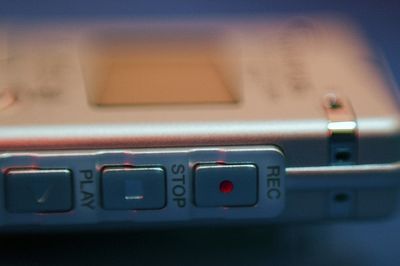
[Photo via]
For the past few weeks, I’ve been working on an article that has required me to interview various luminaries in the NYC-based sex-positive world. This kind of thing always makes me…nauseous. I became a writer, after all, so that I could communicate with others while simultaneously remaining isolated. I even take medication for social anxiety.
But I can’t always get away with merely speaking what’s on my mind. And that’s not necessarily a bad thing. Over the years, my writing has enabled me to meet some fascinating and fabulous people, and to have some incredible experiences.
Yet I still get nauseous pre-interview.
For everyone who suffers as I do, here are 10 interviewing tips for introverted writers:
1. Don’t Take the Easy Way Out:
The least scary way to interview someone is via e-mail. This is what is known as “pussying out.” When you send someone questions online, you don’t get their immediate, gut reactions. You can’t discern tone or inflection. You can’t follow delightful tangents. The best way to interview someone is in person, preferably in a place where your interview subject feels comfortable (though not necessarily in a place with too much background noise). When an interview starts to feel like a casual chat, that’s when the best stuff comes out. If an in-person interview is out of the question, a phone interview is your next best bet. At least that way, you can let the conversation meander where it will.
2. Do Your Homework:
Researching the hell out of both your interview subject and the topic at hand will go a long way in making you feel less, well terrified. Simply put, preparedness equals confidence. Your interviewee will appreciate your preparation as well.
3: Have Pre-Prepared Questions On Hand:
Just as it helps to have at least an outline in front of you when delivering a speech, you should also write up your interview questions beforehand. There’s nothing wrong with deviating from this list of questions, but it’s nice to be able to refer to it when the conversation seems in danger of flatlining. It also helps ensure that you don’t forget to ask your most crucial questions.
4. Check Your Equipment:
Last week, I interviewed a popular sex therapist/author over the phone. I didn’t notice until after we’d hung up that my tape had stopped rolling soon after the 8-minute mark. Oy. You should totally check things like battery power and available tape space before starting your interview.
5. Have a Plan B:
Technology is far from infallible, contrary to popular belief. Um…take notes, even if you’re already recording the conversation.
On real paper.
Wth a real pen.
6. Remember — This is a Conversation…Not an Interrogation:
As mentioned above, the more you treat this like a comfortable conversation, the better it will be, for both of you. And as you let the conversation wander, you may find yourself hearing information you may not have initially thought to ask about. So don’t cling to your prepared questions too closely. Become adept at listening, and sensing when a tangent may bear fruit. If a comment your interviewee makes only ceates more questions in your mind, delve deeper. And, for the duration, strive to keep your interviewee at ease. Those who feel complacent tend to reveal more.
7. Also Remember — You’re Speaking to a Mere Mortal:
I’m always the most terrified when speaking to the authors I most admire. In my mind, such conversations are as exciting and nerve-inducing as a Johnny Depp sighting. But dude. They’re people, too. Just like you. People with self-doubt. People with nervous tics. People who often feel grateful just to be asked about their lives and their work.
Shy people are always told not to worry, because everyone else is feeling just as self-conscious as they are. Shy people never listen. (I…um…know this for a fact.) But they should. It would totally make them feel better.
The same thing applies to interviewers and their subjects.
8. Don’t Rush:
I’ve mentioned it before. Don’t let your nerves get the best of you. Be loud, clear, and slow.
9. Be Polite:
After the interview, send along a thank you e-mail. It was so nice of them to take the time out of their day in order to help you with your piece. And when the piece finally comes out, let them know. They’ll get a kick out of seeing their name in print, and be relieved that you didn’t misquote them in such a way that makes them sound ridiculous or awful.
10. Collapse with Relief:
Phew! I need a nap.
…
Oh! Ive mentioned this before but, if you’d like to read more about conducting a successful interview, you should totally check out Lawrence Grobel’s The Art of the Interview. Good stuff!
Related: How to Avoid Flubbing Your Phone Interview, Product Placement: Audio Recording + Transcribing Resources, Home-Schooled: 20 Books To Build Your Freelance Life Upon

Hi Steph! Thanks for the great tips! I am definitely going to be utilizing them this week as I head out to conduct my first interviews for an article I’m writing for my college’s student newspaper.
Sarah